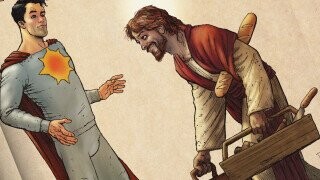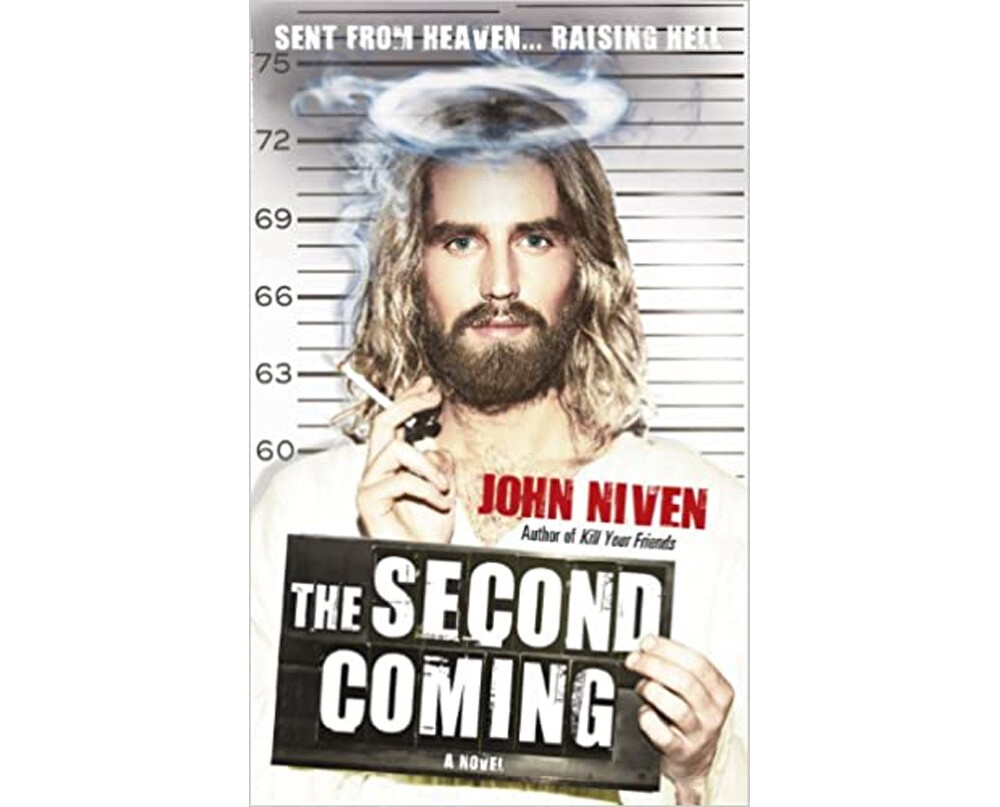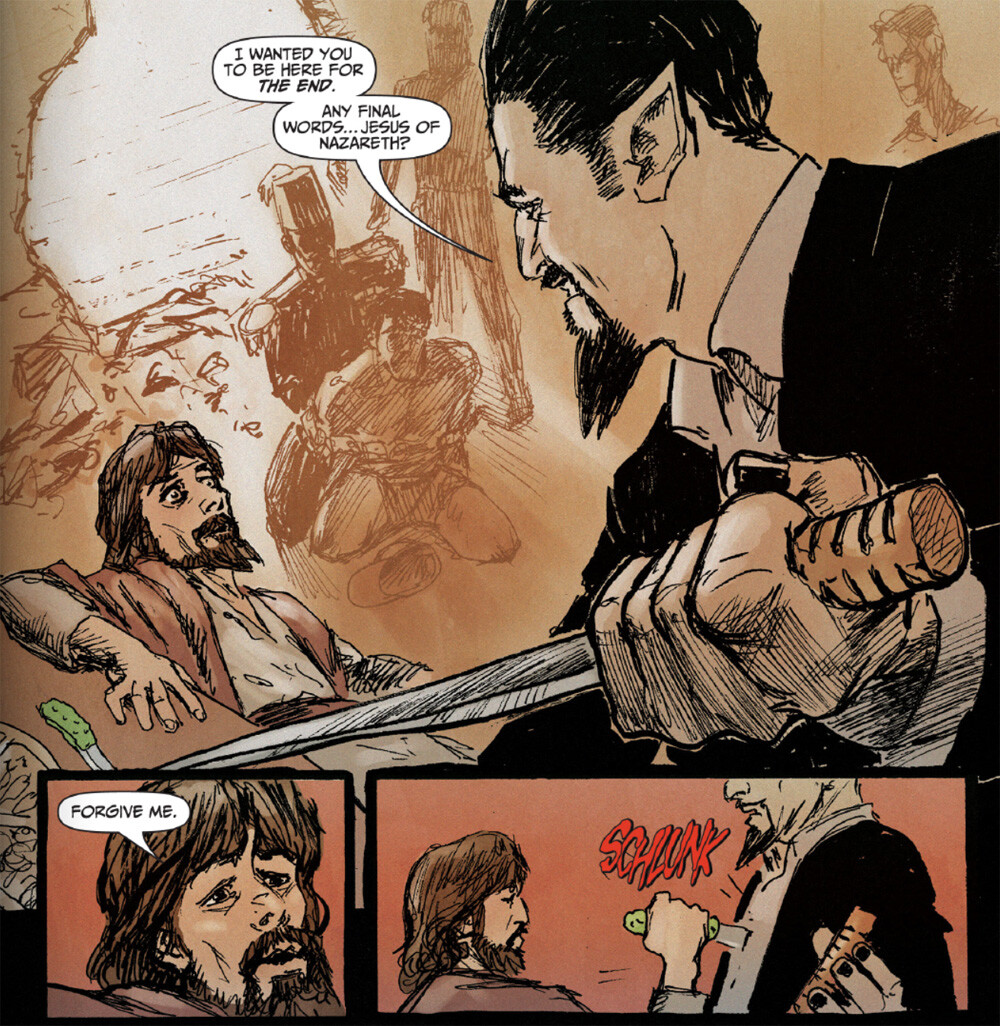4 Bonkers Novels About The Second Coming

At the risk of sounding like a heretic, Jesus was probably a cool guy with good ideas about caring for one another and enjoying life. Yet considering how established religions and televangelists have, shall we say, "distorted" such a simple message, maybe the best way to imagine a Second Coming would be to take a non-fundamentalist angle. Here are four bonkers novels that do just that. Warning: Spoilers ahead, obviously.
The Second Coming: Jesus Starts A Grunge Band And Spreads His Word Through A Reality Show
Influenced by the anti-fundamentalism of Monty Python and Bill Hicks, John Niven’s The Second Coming is a comedic novel with stoner Jesus, so we know we're off to a blasphemous start. The novel begins with the big G going on vacation after checking out the Renaissance and deeming things to be working out pretty well over here. Once he returns, though, God is shocked with the war, suffering, and selfishness with which humans have filled his creation (and the novel’s from 2011, so just imagine how he would have reacted at the ongoing societal collapse or the DCEU). God is then full of divine anger. He thus interrupts his kid’s weed-smoking jamming session with Jimi Hendrix to order him to return to Earth, spread the word once again, and fix this mess.

William Heinemann
Once back, J.C. does what J.C. does: unconditionally help the poor, sick, and rejected, and chastise the powerful who seem to always find reasons not to. Oh, and he also starts a rock band. Clearly influenced by Nirvana, the band allows him to spread the one and only commandment he says matters (and the bane of internet comments everywhere): "be nice."
With his band, his unequivocal message about love, and his whole "no, you don’t get it, I’m literally Jesus Christ" shtick, he soon rises in notoriety, and ends up agreeing to take part in a reality show called American Pop Star. Here we meet one of the novel’s true antagonists: not the Devil, who is just portrayed as a misunderstood frenemy of God’s, but the Simon Cowell-inspired Stephen Stelfox, the show’s producer and a returning character from Niven’s earlier novel, Kill Your Friends.

HarperCollins
Echoing his previous incarnation expelling the merchants from the temple, this Jesus accepts the TV-show gig as it gives him a platform to wake normies up. But tensions immediately arise between Jesus and the money- and power-obsessed Stelfox. The highpoint occurs when Jesus and his friends hijack the TV show’s broadcast to denounce terrorists and fundamentalists, televangelists and capitalists, even what the novel calls the "clown in Rome." So good wholesome fun. And then The Man ruins it.
Indeed, by the third act Jesus has been kicked out of the reality show, but uses his fame to start a commune built on care, respect, and hard days of work ending with beers and weed. Literally, heaven on Earth. Niven, however, soon constructs this self-managed compound as a parallel to Waco, with the ATF predictably coming in to say hi, following their idea that either this Jesus is a grifter leading a death cult, or even worse, actually a good guy threatening the establishment with his silly nonsense about caring for each other. We won’t spell out exactly what happens after the raid goes inevitably wrong, but whether one thinks Waco and the US government’s sloppy response to it are a good parallel for a contemporary retelling of J.C., it does put an interesting spin on the whole Resurrection thing.
Okay, but should I read it?
Probably. The Second Coming is fun to read, has plenty of good jokes and ideas, and its third act is particularly cinematic. Also, its overall messages are pretty clear (if not a bit preachy). If you’re into the idea of a contemporary approach to Jesus having him be a mellow stoner who cares about everyone (and plays good rock music in front of a boy-band pusher), then you should give it a chance.
The Final Testament Of The Holy Bible: Jesus Loves Everyone, By Which We Mean He Has Sex With Everyone.
Unlike Niven’s novel, this is no comedy. James Frey’s The Final Testament of the Holy Bible came out the same year as The Second Coming, and it’s a bit more yikes-y.
This 2011 novel tells the story of Ben Zion Avrohom, an alcoholic New York drifter conceived under mysterious circumstances who becomes convinced he indeed is the Main Dude after surviving a car accident. The novel is narrated through the testimony of his several 'apostles'—pariahs of society like sex workers, drug addicts, and even lawyers—who tell their different stories about meeting Ben, and the predictable destiny that awaits him as a self-proclaimed Messiah. Add in that Ben’s brother Jacob has grown up to be a hateful, bigoted preacher, and things don’t turn out too well for him either.

Mailroom Books
Two things stand out with this novel. First, the bold decision to make Jesus a horndog. It's one thing is to have a new Jesus be kind of a bisexual hippie enjoying free love with everyone, which sounds pretty cool actually, but it's another perhaps more gimmicky thing to have sex be his whole deal. Ben still preaches love, equality, compassion, and anti-establishment sentiments, but really, we cannot stress this enough: he boinks almost every character he meets. Considering there are other ways to show love than to offer sex to everyone (or so says my so-called "therapist"), this really gets distracting.
Speaking of excesses, the other aspect of this novel that needs mentioning is its author's whole deal. As we have already discussed, Frey became infamous after his supposed memoir of his time as an addict in rehab turned out to be a giant pile of lies. Now, if Frey’s career seems to have moved from this controversy, The Final Testament of the Holy Bible’s overly preachy, holier-than-thou style does seem like it is overcompensating for something. Forgiveness is a good thing, to be sure, but such sanctimonious speeches might be demanding a bit too much.
Okay, but should I read it?
Kinda. We don’t mean any sort of straight-up ad-hominem dismissal of the book, for it has its own merits and problems. Still, it's like its two main qualities (being led by a Jesus who, again, screws everyone because he "loves" them, and being so annoyingly preachy) say more about the voice writing it than about the writing itself.
So about why you should read it, well, it is an interesting story, some of its chapters are very well written and with engaging characters, and it is another example of how an atheist author can get Jesus better than those who pretend to follow him. As for the novel’s problems and contradictions, one critic put it best: "This book of prophecy, written by one of the most famous liars of our time, is also an ode to the purity of poverty that costs $50, a cry against exploitation by the founder of a notorious digital sweatshop and an expression of hubris from a man ostensibly humbled first by his addiction and then by his very public discrediting."
Second Coming: Jesus Crashes With Superman, Then Stabs The Devil
Originally meant to be released by DC/Vertigo and then picked up by Ahoy Comics, Mark Russell and Richard Pace’s 2020 graphic novel Second Coming was met with hostility by the sort of groups who apparently missed Niven and Frey (but were still aching to annoy normal people after boycotting Dogma). Its plot follows some ideas from Niven’s The Second Coming (for example, Dad and Son just chillin’ in Heaven before the latter is commanded to return to Earth), and it even repeats the Bill Hicks bit about a returning Jesus not being too fond of people using crosses, which had opened Niven’s book.
Similarities aside, Second Coming tells the story of Jesus crashing with a Superman-like superhero named Sunstar. God himself asks Sunstar to teach his son how things really work down here, to get him to abandon his naive obsession with forgiveness. In its original run, what follows are six issues about Sunstar teaching Jesus the violence needed to keep peace, and Jesus teaching Sunstar the ridiculousness of pretending to keep peace through violence.
As you can guess, this is another novel that gets preachy (this seems to come with the genre), while also being a pretty predictable take on the "what would happen if Superman met Jesus" idea. Something that isn’t so predictable? In a third act that happens way too fast for the comic’s own good, Jesus ends up stabbing the Devil with a butter knife to stop him from ending the world.

Ahoy Comics
The problem is that nuance and surprises are seriously lacking in Second Coming. God is a strict parent, Jesus is naive and good-intentioned, the Devil is irredeemably evil, Sunstar is a hothead with hidden insecurities, even the Batman-surrogate is a billionaire try-hard struggling for Sunstar’s attention. As for the lessons learned by the characters, they are all pretty expected as well: Sunstar learns not every problem can be solved with punches, and Jesus learns that force is sometimes needed to make things right—an idea that, again, he was already acquainted with.
Okay, but should I read it?
If you want to. Some ideas held by Second Coming’s Jesus are interesting, but if we’re going with the whole "what if Jesus returned to our current awful reality," then other attempts are better. Factor in Second Coming’s uninspired storylines, a conclusion that is way too rushed, and an art style that's sometimes just plain ugly, and this simply feels like the less interesting take on the gimmick. Still, Mark Russell’s Flintstones run is apparently very good.
This is the gem of the genre, Gore Vidal’s 1954 novel, Messiah. An undeniably controversial figure, the somewhat forgotten Vidal was an openly bisexual public intellectual who was writing novels about transexuality and denouncing the white supremacist ideology hiding in the Republican party back in the late '60s. He was a high-brow author who answered the reproach of being anti-American by saying his literary production made him America's official biographer. He was an anti-imperialist political commentator that was criticizing the corporate police state before stuff like 9/11 and the Patriot Act. And this guy wrote a novel about the second coming in 1954.

Dutton
Messiah is presented as the memoir of Eugene Luther, one of the first followers of John Cave, a mysterious undertaker/preacher gaining a cult following in '50s California, and clearly named after Jesus Christ (either that or John Connor, was Vidal also a time-traveler?). And it is a memoir because Messiah is not set in the '50s, but rather in a future where Cave’s religion, Cavism, has already overtaken most of the planet. What the novel offers, then, are Luther’s recollections of his time working with Cave and the group formed around him. We get to read about the religion’s beginnings, its world-conquering growth, and of course the struggles, resistances, and betrayals that go with it.
The superior literary piece, Messiah does not repeat the trap of preachiness, at least not in the same way as the other examples in this list. You see, unlike the easier path of adapting Jesus’ return around love or forgiveness and thus using it to condemn modern society’s abandonment of these values for money, power, or whatever Jeff Bezos craves (we’ll go with pee), Messiah focuses on deeper issues: life and death. The subtler core conflict of Vidal’s novel, then, is between Cave’s teaching of accepting death, and Luther’s interpretation of said teaching as if it dealt with affirming life. The difference might seem trivial, but it echoes more brainy debates within Christianity itself, and even with criticisms around the very figure of Christ.
Okay, but should I read it?
Definitely. For better or worse, Vidal’s entire work deserves a reappraisal, and a short but punchy novel with such an interesting plot that borders on dystopian sci-fi is definitely a good place to start. So imagine the novel becomes popular after almost 70 years, and we finally get a big, glossy, Denis Villeneuve Hollywood adaptation. Wouldn’t that be awesome?
Top image: Ahoy Comics
